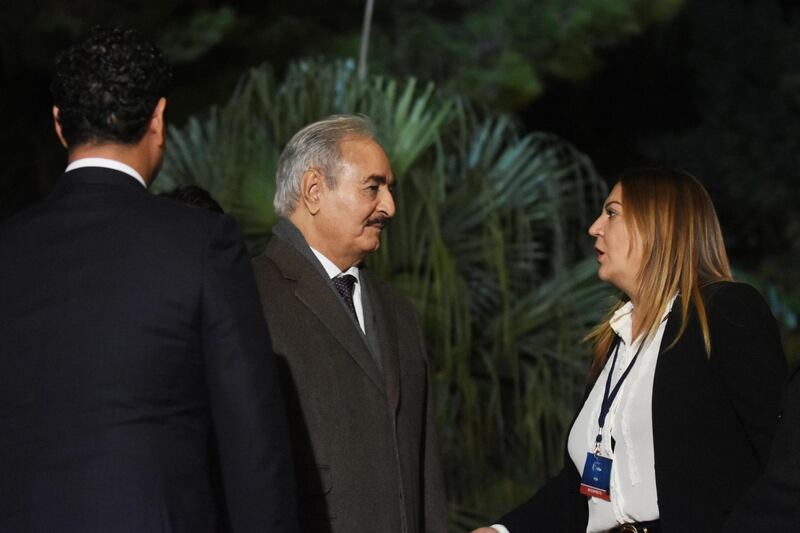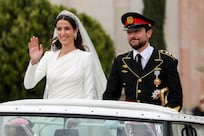An international summit on Libya closed on Tuesday, with the country’s key political leaders committing to a UN-led political process that aims to hold elections in the North African country by June of next year.
Libyan General Khalifa Haftar, who controls east of the country, and his political rival, Prime Minister Fayez Serraj, head of the Tripoli-based Government of National Accord (GNA), have both expressed backing towards a UN action plan that calls for a national conference early next year prior to elections.
The commitment marks a major diplomatic breakthrough that could potentially kick-start a stalled political process and trigger elections after nearly eight years of strife.
"[Mr] Haftar is committed to the political process," UN special envoy Ghassan Salame told reporters at the end of a reconciliation conference in Palermo on Tuesday, saying that he was informed of this commitment by one of the general’s representatives.
Mr Serraj's spokesman said on Twitter that the prime minister was also committed to the UN plan, which Mr Salame first announced last week, after scrapping an earlier roadmap agreed upon in Paris in May which called for elections to be held in December.
Tuesday’s outcome came after Mr Haftar and Mr Serraj held a rare meeting on the side-lines of the summit- their first in over five months.
During talks, Mr Haftar said that he would be happy if prime minister Serraj were to stay in power until elections are planned, an Italian diplomatic source told The National.
“We don't have to change the horse midstream," the head of the east Libyan faction was quoted as saying on Tuesday, referring to the country's need to reach elections unscathed. Talks of continuation indicates that General Haftar too is likely to retain his position as head of the LNA.
The two leaders talked “a lot, alone” after the meeting with Prime Minister Giuseppe Conte, the Italian diplomatic source said, saying the pair walked off to the side of the room to discuss matters.
Mr Conte shared photos of the meeting on Twitter, showing both Mr Haftar and Mr Serraj smiling alongside Abdel Fattah El Sisi, the EU’s Donald Tusk, Tunisian president Beji Caid Essebsi, and Russia’s Prime Minister Dmitri Medvedev, among other leaders. In one photo, the pair appear to be sharing an embrace with the Italian PM.
The meeting was not welcomed by Turkey’s delegation to Palermo, which pulled out of the conference, saying it was “deeply disappointed” at being left out.
Following the meeting, Mr Salame told delegations at Palermo that Libyans should be at the helm of the peace process and, to that end, the next step should be a meeting on Libyan soil.
“There are no military but only political solutions, and Libyans have to find them. Delaying the political solution only negatively impacts current and future Libyan generations,” he said.
The representatives of two other key Libyan factions were also present on Tuesday. Ageela Saleh, leader of the Libyan House of Representatives; and Khaled Meshri, head of the State Council, an advisory body to the GNA, also met Mr Conte and Mr Salame, who shuffled between numerous delegations.
Frederic Wehrey, senior fellow at the Carnegie Endowment for International Peace said that “Italy has certainly achieved a good photo op,” following talks.
However, Rome still lacks the clout to forge a real international, regional and Libyan consensus, he told The National.
“The abrupt departure of Turkey, a key player in Libya, demonstrates this, as does a French Foreign Ministry statement which barely disguises the rivalry with Italy and tries to portray the Palermo meeting as a continuation of the Paris summit,” he said.
Italy has been trying to reassert control over the Libyan peace process after French President Emmanuel Macron convened a surprise summit in Paris in May in a bid to push for Libyan elections on December 10.
The summit in Palermo was largely read by analysts as an attempt by Rome to regain diplomatic leadership over the Libyan dossier.
Although Mr Haftar met Mr Serraj, the general poured scorn on the summit. “I will not take part in the summit even if it takes 100 years,” he told Libyan Tv. He said he had come to Italy only to have bilateral meetings with leaders of neighbouring countries, casting a shadow over the talks.






